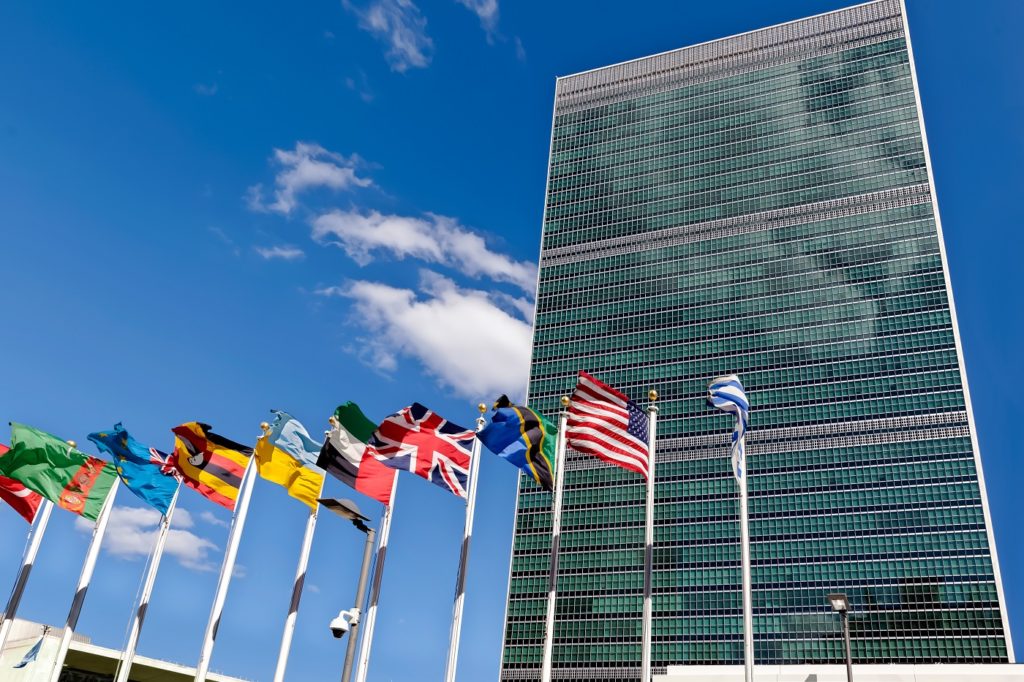When Joe Biden was sworn in on January 20, international bureaucrats and progressive political elites collectively breathed a sigh of relief. For four years, they complained of a “crisis of multilateralism” brought about by Donald J. Trump. Now that a Democrat is in the White House, they are hailing a new springtime of international cooperation, as if the crisis of multilateralism had never existed.
The truth is, multilateralism is still in crisis. It was in crisis long before Trump took office.
The real crisis of multilateralism is this: the multilateral system, made up of a constellation of international organizations like the United Nations and NATO, is no longer a tool for international cooperation among sovereign states. It has become a vehicle for the world’s progressive elite to impose social and economic uniformity on the world without regard for sovereignty or political legitimacy.
Since the fall of the Berlin Wall, Western countries have transformed the multilateral system into a neo-colonial structure for social and economic engineering. This has been accomplished in a piecemeal way through a complex network of binding and nonbinding resolutions and agreements like the United Nations Sustainable Development Goals, the Human Rights Council, and the Paris Accord on climate change. These agreements establish mechanisms that attempt to impose common policy targets for all countries equally and elevate the recommendations of UN experts as a gold standard in policy debates. In this way, there has been a gradual and coordinated effort to expand international control of domestic policy space across the globe.
Start your day with Public Discourse
Sign up and get our daily essays sent straight to your inbox.Conservatives laughed all this off for decades, deriding schemes to promote the “green economy” and “gender equality” as toothless. They were wrong to scorn the multilateral system. Their inattention only gave the progressive left complete control. Now, as the Biden administration attempts to end our reliance on fossil fuels and is well on the way to destroying female sports, with only the Senate filibuster standing in the way, conservatives need to wake up and take the United Nations seriously. If American conservatives want to be relevant to the world, they must recognize the urgent need to invest in research, policies, and personnel to reform the multilateral system, making it a strategic priority for conservative foreign policy.
The Conservative Disadvantage in Multilateral Institutions
Conservatives have never fully appreciated or understood the power and influence of international mechanisms, much as they have never really appreciated the power of bureaucracy domestically. In fact, some conservatives have long desired that the United Nations fail, as Colin Dueck chronicles in his celebrated book, Age of Iron: On Conservative Nationalism. Conservatives of a populist bent have simply opposed the United Nations as an evil, un-American force intent on stealing U.S. sovereignty.
The dominance of neoconservatives in establishing Republican foreign policy hasn’t helped. The conservative foreign policy establishment only sees the United Nations as a tool to wield uncontested U.S. power, not to promote respect for sovereignty and amicable relations between sovereign states. This triumphalist approach has prevented conservatives from treating multilateral institutions realistically or using them to defend American sovereignty and advance our interests abroad, and it has resulted in lack of attention to multilateralism from conservative institutions. It is also the reason why Republican administrations seem powerless to influence the United Nations with conservative reforms, leaving the government channels dedicated to multilateralism wholly to the control of alternating Democratic administrations.
Unlike conservatives, progressives deftly use the United Nations as a tool to advance their policy goals. Progressives in academia, think-tanks, philanthropic foundations, and political organizations are fully invested in multilateralism. Thousands of experts who work for these institutions circle in and out of the federal government and international organizations. They are always ready to fill every political vacancy related to the UN and other international organizations. These experts believe in and are ready to wield the power of international policy to advance their goals, and they shape global institutions to great effect. Conservatives, by contrast, can hardly staff political foreign policy posts in Republican administrations.
Unsurprisingly, given all this, Democrats are very comfortable surrendering U.S. sovereignty to international bodies when it comes to issues like human rights, the environment, health, and even peace and security, alongside their progressive friends in Europe. They defend the United Nations as a force for good with a zeal rivaling the devotion of Catholics toward the papacy. When Republicans in the White House pathetically attempt to extricate the United States from transnational integration, Democrats rely on their European allies and the bureaucratic inertia of the deep state to hold the line in international fora.
Because of this advantage, accumulated over many decades, progressives are deeply embedded in the U.S. State Department bureaucracy. For four years, they sabotaged and slow-walked the Trump administration’s policy goals. The few effective political appointees in the State Department ecosystem were buried under piles of bureaucratic gibberish or ousted through bureaucratic traps. As soon as Biden was sworn in as president, U.S. diplomats seamlessly switched positions and began to effortlessly promote the Biden agenda—or, more accurately, the agenda of the German-led progressive European bureaucracy.
Why Save Multilateralism?
Today, international security challenges are mounting, and the balance of power in the world is rapidly changing as Russia spirals into decline. While the United States remains the world’s largest superpower both economically and militarily, our power has declined relative to the whole. New great powers have emerged since the United Nations was founded. World leaders rightly ask themselves if it still makes sense to legitimize a multilateral system that no longer reflects the true balance of power.
The United Nations clearly isn’t a panacea for the world’s problems. It has generally been powerless to stop genocidal civil wars. In some ways, it is a colossal waste of money, and many of its mechanisms are little more than a very expensive game of show-and-tell for progressive elites. Still, multilateralism has not reached the end of its useful life.
First and foremost, multilateralism has been effective at defusing global tensions. Without the United Nations as a cushion between the United States and the Soviet Union, the Cold War could have easily escalated to a full-blown conflict, and for the last thirty years, the UN has provided an essential outlet to defuse the Israeli–Arab conflict. The Abraham Accords would have never happened unless Arab nations could continue to contest the existence of Israel at the United Nations. And it is currently an important venue where the tensions between China and the United States are playing out peacefully in a new cold war–like situation. The importance of this aspect of the UN’s role cannot be underestimated.
Beyond the extreme scenario of international conflict and war, the United Nations and other multilateral institutions have an important role to play in U.S. foreign policy. The United Nations system is influential normatively, through multilateral diplomatic mechanisms, as well as programmatically, through development assistance. The language of the policies agreed to by UN member states—and the guidance of the UN bureaucracy that follows such agreements—are the basic parameters of development cooperation agreements. They form the basis of the laws and policies used by developing countries to please their wealthy partners and by international aid agencies to rebuild countries after conflicts.
Moreover, the United Nations is the world’s foremost diplomatic exchange, where leading diplomats and politicians test their geopolitical theories and strategies. Ironic though it may seem, no other forum in the world offers a better opportunity for conservatives to promote an approach to foreign relations that is respectful of sovereignty in order to halt the progress of the global progressive left.
As U.S. power declines, its leaders should be working to protect a global order that respects sovereignty and promotes international cooperation between amicable states. The United Nations, as originally founded, is precisely such an order. The sovereign equality of states is the foundation of the UN Charter, adopted seventy-five years ago. This kind of international order is one that is supported by the vast majority of countries in the world.
The United Nations clearly isn’t a panacea for the world’s problems. Still, multilateralism has not reached the end of its useful life.
The United Nations Is Here to Stay
It would be impossible for Republicans to wholly disentangle the U.S. from the United Nations bureaucratic web, even if Republicans earnestly wanted such a parting of ways. For starters, Democrats are wholly invested in transnational integration. As Democrats cycle into power, any Republican withdrawal efforts are brushed away, as is now the case. In fact, many Republicans join the Democrats to support legislation that requires the federal government to align with international goals and to work through the United Nations to achieve international objectives. One example is the Women’s Entrepreneurship and Economic Empowerment Act of 2018 (WEEE Act), which essentially codified the Obama administration’s alignment of the entire U.S. foreign policy machinery with international “gender” policies. Similarly, Congress adopted requirements for the president to work through the United Nations to address child marriage, rather than directly imposing funding restrictions related to this condition on both implementers and UN system actors, in the Preventing Child Marriage in Displaced Populations Act of 2019. This approach fritters away U.S. sovereignty and the legislative prerogative of the American people in a piecemeal way. Unless conservatives begin to resist this trend, it will keep expanding in more and more policy areas.
Consider also how the preferred mode of international development cooperation is increasingly to create untraceable and unaccountable slush funds of hundreds of millions of dollars for international partnerships between the United Nations, non-governmental organizations, and foreign governments to address a wide range of issues, including health, gender equality, and human rights. These include The Global Fund to Fight HIV/AIDS, the Global Fund to End Modern Slavery, and the Partnership for Maternal, Newborn, and Child Health, among many others.
Outside the United States, many nations are heavily invested in multilateralism, beginning with the European Union and the many countries in Africa and Latin America that rely heavily on their financial assistance. These nations’ political, bureaucratic, and legal machineries have grown dependent on the interplay of their government with international organizations and regional groups and mechanisms.
A sudden disappearance of multilateralism, even if a war were to break out, is highly unlikely. Even if the United Nations is dramatically reconfigured or a successor organization is founded following some future global conflagration, multilateral institutions will continue to play a large role in global power politics. The question was never whether conservatives should engage the multilateral system or not. It was always what kind of multilateralism conservatives want: one that is accountable to self-governing sovereign states and advances U.S. interests, or one that is wholly untethered from political oversight and unaccountable to the American people.
Multilateralism is here to stay, and it is not prudent for conservatives to continue to ignore this. Unless UN policy is in line with U.S. priorities, we will be at a disadvantage. And if conservatives don’t promote a vision of multilateralism that respects U.S. sovereignty, it will inevitably hurt us down the road.
This essay has been adapted from the latest C-Fam Definitions Issue.














